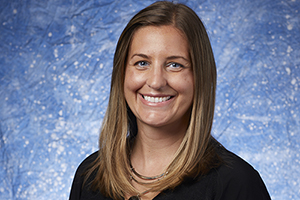COVID Vaccine Q&A With Pediatric Pharmacist

Editor's note: This article was written prior to University of the Sciences' merger with and into Saint Joseph's University and does not reflect the current, combined institution. References to programs, offices, colleges, employees, etc., may be historical information.
 Associate Professor of Clinical Pharmacy Danielle Alm, PharmD, who specializes in pediatric pharmacy, shares some answers to frequently asked questions patients and their families may have about the COVID vaccine approved for use in children.
Associate Professor of Clinical Pharmacy Danielle Alm, PharmD, who specializes in pediatric pharmacy, shares some answers to frequently asked questions patients and their families may have about the COVID vaccine approved for use in children.
Q: What is significant about having a COVID vaccine approved for children and adolescents?
A: Children along with adolescents and adults can now help to prevent the spread of COVID-19 especially to others who are not eligible for vaccination. Vaccination can help kids stay healthy, keep them in school, safely participate in sports, and group activities.
Q: Why is it important that eligible children get the COVID vaccine?
A: Children can still develop symptoms if infected with the COVID-19 virus and get very sick. Children are at risk for a very serious complication from COVID-19 called multisystem inflammatory syndrome (MIS-C). MIS-C is a condition where multiple organs (lungs, kidneys, heart, brain, skin, eyes) can become inflamed. Even though children are at a lower risk of becoming very ill with COVID-19, they can still spread the virus to others who may not be eligible to receive the vaccine at this time. The vaccine is proven to be effective. Research shows the COVID-19 vaccine for children ages 5-11 years old is 91% effective and 12-15 years old is 99% effective.
Q: If a child already had the COVID-19 virus, should they be vaccinated?
A: It is still recommended for children who have previously had COVID-19 receive the COVID-19 vaccine. This is because currently it is unknown how long your child will be protected from getting sick again from COVID-19.
Q: What should I know before getting my child vaccinated?
A: The Pfizer-BioNTech COVID-19 vaccine for children ages 5-11 and 12-15 years old is safe and effective. The vaccine study reviewed thousands of children in both age ranges and found only reports of mild side effects from the vaccination including headache, arm pain, low-grade fever, and fatigue. Incidence of myocarditis was extremely rare, occurring only in teenage populations (12-17 years old) and in male patients. This vaccine has the same ingredients as those given to adults, but in a smaller dose. A second vaccine is needed three weeks after the first vaccine. The vaccine is safe for all people 5 years of age and older, does not impact fertility or alter DNA. It is recommended by the World Health Organization, US Centers for Disease Control and Prevention, US Food and Drug Administration, American Academy of Pediatrics, American Medical Association, and the American Nurses Association.
